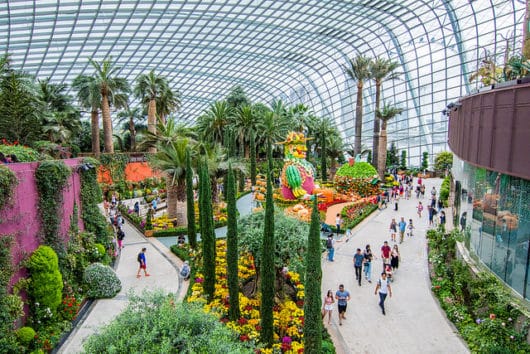Top 10 Facts About Living Conditions in Singapore

Along the southern coast of the Malay Peninsula occupying roughly 718 kilometers worth of estate lies the smallest nation of Southeast Asia.
Singapore, originating from the Malay word, Singapura, meaning Lion City, is home to a population of roughly six million people, a largely non-corrupt government and a near spotless metropolitan district.
From its diverse socio-cultural community to the clean and eco-friendly urban environment, Singapore boasts some of the highest living standards in all of Asia.
According to the 2018 World Happiness Report, the country has been deemed the “happiest country in Southeast Asia”.
Among the plethora of reasons supporting this title, in the article below top 10 facts about living conditions in Singapore that make it one of the friendliest countries in Asia and the world are presented.
Top 10 Facts About Living Conditions in Singapore
- Singapore has a very competitive economy. Thanks to a corruption-free business environment, pro-foreign investment and export-oriented policies, Singapore features a highly developed free-market economy. Furthermore, secure property rights effectively promoting productivity growth and entrepreneurship contribute to Singapore’s economic status as the second freest among 43 countries in the Asia-Pacific region, according to the 2018 Index of Economic Freedom.
- Singapore is a parliamentary representative democratic republic. As such, its stable political climate is based on rationality and the rule of law. According to the founding father of Singapore, Lee Kuan Yew, his city-state seeks to offer first world conditions in a third world region.
- The country has an advanced education system. Singapore prides its education system for instilling students with a high standard of learning. The average number of years spent in the education system is 11.3 for males and 10.4 for females. Singapore’s three local universities: National University of Singapore, Nanyang Technological University and Singapore Management University are globally renowned. According to the 2018 Financial Times “Top 100 Global MBA,” they rank among the Top 50 International Business Schools.
- While Singapore has some of the strictest laws of nations worldwide, including capital punishment for drug possession and harsh penalties for disorderly conduct, the outcome has been a country with some of the lowest crime rates in the world. In Mercer’s personal safety ranking, Singapore placed first in Asia and eighth globally.
- Renowned for its technological advancements in medicine and practiced doctors, Singapore offers affordable health care and subsidized medical services through its public-private partnership in the health care system. The density of physicians to the population is 1.83 in 1,000 people. In 2010, in the World Health Organization’s ranking on the World’s 100 Best Health Systems, Singapore ranked sixth.
- Another positive product from Singapore’s abundance of stern laws is that the city is remarkably clean. With bans placed on public smoking and minimal traffic congestion, Singapore has maintained “good” to “moderate” range of air quality for much of 2017, according to the National Environmental Agency.
- For shopping lovers, Singapore is close to a dream come true. It is full of malls and department stores, carrying everything from the latest gadgets to popular clothing brands. Aside from dining and shopping, Singapore also offers a vibrant nightlife along with seasonal festivals and concerts.
- Singapore’s cultural network is composed of a unique array of multiple groups from Malays to Chinese and from Indians to expats from various countries. The city-state places a strong emphasis on community and racial harmony.
- The country has a very stable climate. Singapore’s climate resembles that of a tropical rainforest – it’s generally hot and humid year-round with prolonged periods of rain showers. The annual average high is 89 degrees Fahrenheit, and its annual total precipitation equates to 166 days of rainfall. The upside is that based on its geographical location, Singapore is generally safe from natural disasters.
- Singapore’s public transportation system consists of highly advanced modes of transit, including taxis, buses and the Mass Rapid Transport (MTR) rail system. Taxis and buses are also affordable, costing as little as $0.70 per trip.
As illustrated by this list of the top 10 facts about living conditions in Singapore, that despite its strict laws and seasonal hot and humid climate, the Asian city-state vaunts numerous desirable merits.
With a diverse friendly culture, progressive political system and safe environment in addition to a multiplicity of other positive influential factors, Singapore rightfully earns its name as one of the top cities in Asia for a high quality of living.
– Johnna Bollesen
Photo: Flickr
